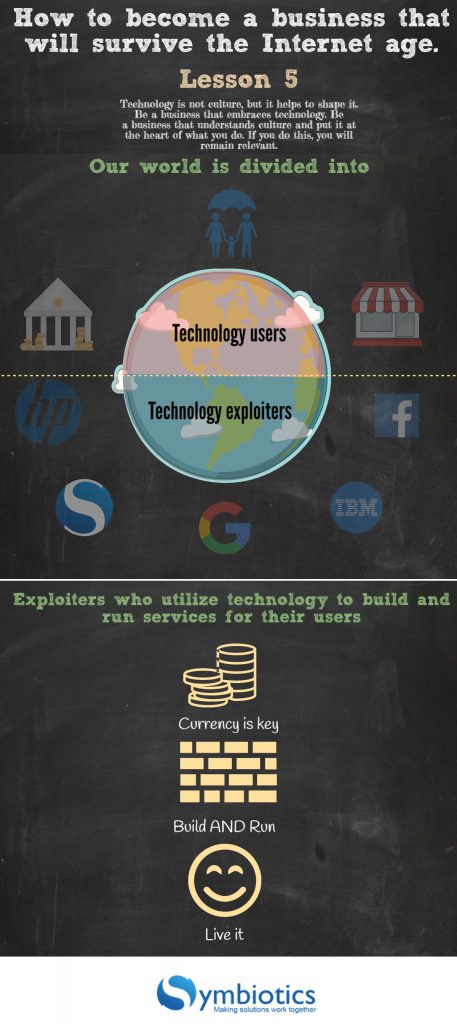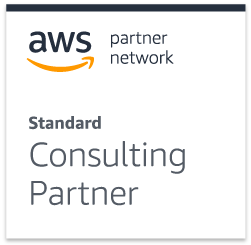Part 5 of a 10 part series of 10 Lessons on becoming a business that will survive the Internet age.
Technology is not culture, but it helps to shape it. Be a business that embraces technology. Be a business that understands culture and put it at the heart of what you do. If you do this, you will remain relevant.
There are many definitions and interpretations of culture and the one most pertinent to this lesson is “the behaviors and beliefs characteristic of a particular social, ethnic, or age group:” in this case, our company.
In order to explore this lesson further, let’s divide the world into those that “exploit” technology and those that are “users” of technology given these examples for clarification:
Exploiters include the likes of HP, Google, Facebook, IBM, Symbiotics and Oracle whereas users include banks, insurance companies and retailers.
For the purpose of brevity we’ll focus on the exploiters who utilize technology to build and run services for their users
Currency is Key
 We can argue whether competitiveness is a good thing or a bad thing. It really doesn’t matter because it exists and in a big way. When a group of software engineers, get together, the structured COBOL programmer of the 1970s doesn’t get much attention but those using Gulp, Grunt, Angular2, Docker (catchy names aren’t they?) certainly hold the floor. These last mentioned technologies are currently superseding the likes of JS and Chef which in themselves are relative newcomers reminding us of the hectic rate of change we need to keep pace with. If our company doesn’t keep pace we will not be relevant i.e. not chosen by the software engineering job seekers, in a market where supply comes nowhere near meeting the demand and the gap will only grow in the foreseeable future, and not chosen by the “users”. We need to bear in mind (and this is mentioned in Lesson 1) that our software engineers must keep up with the leaders or lose the race, they must remain marketable and relevant, and if we don’t help them do it someone else will. Empowering our teams to research, test and motivate new technologies is part of our core value of Lifetime Learning. Let them decide on the how after you’ve specified the what.
We can argue whether competitiveness is a good thing or a bad thing. It really doesn’t matter because it exists and in a big way. When a group of software engineers, get together, the structured COBOL programmer of the 1970s doesn’t get much attention but those using Gulp, Grunt, Angular2, Docker (catchy names aren’t they?) certainly hold the floor. These last mentioned technologies are currently superseding the likes of JS and Chef which in themselves are relative newcomers reminding us of the hectic rate of change we need to keep pace with. If our company doesn’t keep pace we will not be relevant i.e. not chosen by the software engineering job seekers, in a market where supply comes nowhere near meeting the demand and the gap will only grow in the foreseeable future, and not chosen by the “users”. We need to bear in mind (and this is mentioned in Lesson 1) that our software engineers must keep up with the leaders or lose the race, they must remain marketable and relevant, and if we don’t help them do it someone else will. Empowering our teams to research, test and motivate new technologies is part of our core value of Lifetime Learning. Let them decide on the how after you’ve specified the what.
“Use what you sell” is a great slogan and properly employed provides us with the ability to:
- Experiment with the technologies before launching them into the customer services that we develop
- Constantly review the effectiveness of the technologies
- Take on the user mantle – subject ourselves to a 180° assessment
- Become expert in our chosen technologies by accelerating the time spent on them striving for the 10000 hours to reach expert
- Influence our clients to adopt our selected technologies
All of the above provides us with differentiation so hard to come by.
Build AND Run
There is a significant market shift to “users” who have dabbled at being “exploiters” reverting to their core business and leaving the non-core stuff to the experts. This market shift encompasses “build and run it for me”. Cloud adoption is frenetic – everyone wants to be there and unlike what the uninitiated think it’s not like stepping off a log”. In this case, we are both a “user” and “exploiter”. We have interred our in-house infrastructure over the past 5 years and, apart from our laptops, have little more than a few Wi-Fi routers and our firewall to manage. In summary, we adopted the cloud some 5 years ago and now ‘use what we sell’ and with our AWS consulting partner status are in a league of our own.
Live it
The best technologists are hobbyists. People that eat, breathe and sleep technology. We have a core team who given the slightest opportunity delve into the latest gimmick, tech-based service and share their know-how, formally and informally, with the broader team. Our clients are encouraged to set aside time both for tech exchange and testing which is likely to be a client selection criterion in the future. We are in the process of building a learning roadmap to identify the needs for role fulfillment with the end goal of differentiating ourselves on product and service quality. We re-evaluate the technology choices we have made annually and undertake a refresh in need. The growth of our people is of paramount importance to them and at any one time at least half our team is studying for the likes of a technical certification or a masters or honours degree. Our core value, the Spiderman Principle provides our people the flexibility to continue working without it impacting on their studies.
So in summary, a culture of keeping up, maintaining relevance is a challenge… staying ahead is even tougher.
Related Posts:
10 Lessons on becoming a business that will survive the Internet Age
Published courtesy of Future World and because these lessons resonate with us.



